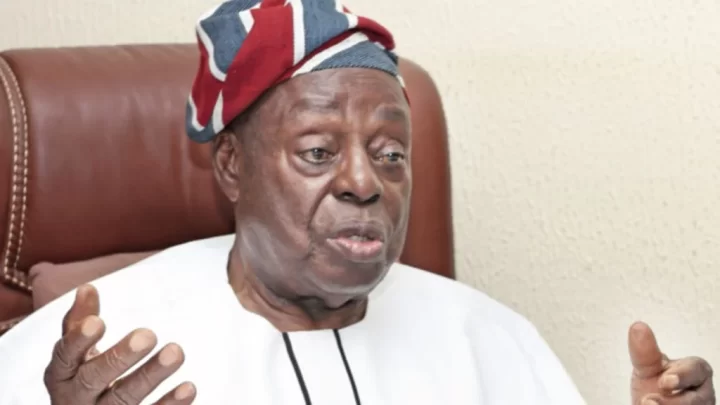Elder statesman and founder of Afe Babalola University, Ado-Ekiti (ABUAD), Aare Afe Babalola (SAN), has raised serious concerns over Nigeria’s rapidly increasing debt profile, warning that the trend is eroding investor confidence and discouraging foreign investment inflows into the country.Speaking during an economic forum in Ado-Ekiti, Babalola lamented that Nigeria’s current fiscal trajectory poses a significant threat to its economic sovereignty and future development prospects. He explained that the growing debt burden, coupled with weak revenue generation, has created an unsustainable financial environment that deters potential investors from committing capital to Nigeria.
According to Babalola, Nigeria’s debt has ballooned to alarming levels in recent years, with the federal government increasingly relying on borrowing to finance its budget deficits. He noted that this pattern has raised questions about the nation’s fiscal discipline and long-term capacity to service its obligations.

“The rising debt profile of Nigeria is not just a figure on paper; it is a clear reflection of financial mismanagement and misplaced priorities. Investors around the world are watching closely, and many are becoming wary of bringing their money into a country that appears trapped in a debt cycle,” Babalola stated.
He further warned that continuous borrowing without corresponding productivity growth is a recipe for economic stagnation. According to him, Nigeria’s debt-servicing costs are already consuming a large portion of government revenue, leaving little room for investment in critical infrastructure, education, and healthcare.
“Foreign investors are concerned because they see a government spending more on debt servicing than on development. When the cost of servicing debt surpasses investment in human capital and public infrastructure, it signals fiscal distress,” he added.
Babalola stressed that beyond the numbers, the perception of fiscal irresponsibility could have long-lasting effects on investor sentiment. He urged the federal government to prioritize revenue diversification through industrialisation, agriculture, and non-oil exports instead of relying on loans to finance recurrent expenditure.
He also advocated for stringent debt management reforms, including transparency in loan utilization and stronger parliamentary oversight of borrowing decisions. “Every loan must have a clear economic purpose. Nigeria must borrow only for projects that can generate returns to repay the loans. Otherwise, we are simply mortgaging the future of our children,” he said.
Babalola, who has been an outspoken advocate for fiscal prudence and economic restructuring, reiterated that attracting foreign direct investment (FDI) requires a stable policy environment and credible economic management. He noted that investors prefer economies with sound governance, stable currency policies, and low debt risks.
Economic analysts have echoed Babalola’s concerns, pointing out that Nigeria’s debt-to-GDP ratio, though still moderate compared to some African peers, is less relevant given the country’s weak revenue base. According to recent data, more than 70 percent of Nigeria’s government revenue is currently spent on servicing debt, a situation experts describe as “fiscally unsustainable.”
Dr. Kunle Adebisi, an economist, said that Babalola’s warning should serve as a wake-up call for policymakers. “Debt is not inherently bad, but when it is used to finance consumption rather than investment, it becomes a burden. Investors track these indicators closely. If Nigeria fails to demonstrate fiscal discipline, foreign investors will continue to stay away,” Adebisi said.
He added that the uncertainty surrounding Nigeria’s exchange rate and inflation trends has compounded investor hesitation, with many multinational firms adopting a wait-and-see approach.
Babalola also expressed dismay over the government’s dependence on foreign loans, warning that the rising external debt could expose Nigeria to foreign influence and policy manipulation. He urged the government to focus on mobilizing domestic resources through improved tax administration, public-private partnerships, and reduced corruption.
“Our future cannot depend on the goodwill of foreign creditors. Nigeria must look inward and harness its abundant human and natural resources to generate wealth. We must learn to live within our means,” he emphasized.
In conclusion, the legal icon called for a national dialogue on fiscal responsibility and economic reform, stressing that the solution to Nigeria’s financial challenges lies in visionary leadership, prudent management, and strong institutions.
“The time has come for Nigeria to rethink its economic model. We cannot continue to borrow endlessly and expect investors to see us as a safe destination for their funds. The confidence of investors is earned through discipline, transparency, and stability,” Babalola said.
His remarks have since sparked renewed debate among economic stakeholders and policymakers, many of whom agree that Nigeria must urgently address its growing debt burden to attract sustainable investment and restore confidence in its economy.
Support InfoStride News' Credible Journalism: Only credible journalism can guarantee a fair, accountable and transparent society, including democracy and government. It involves a lot of efforts and money. We need your support. Click here to Donate
